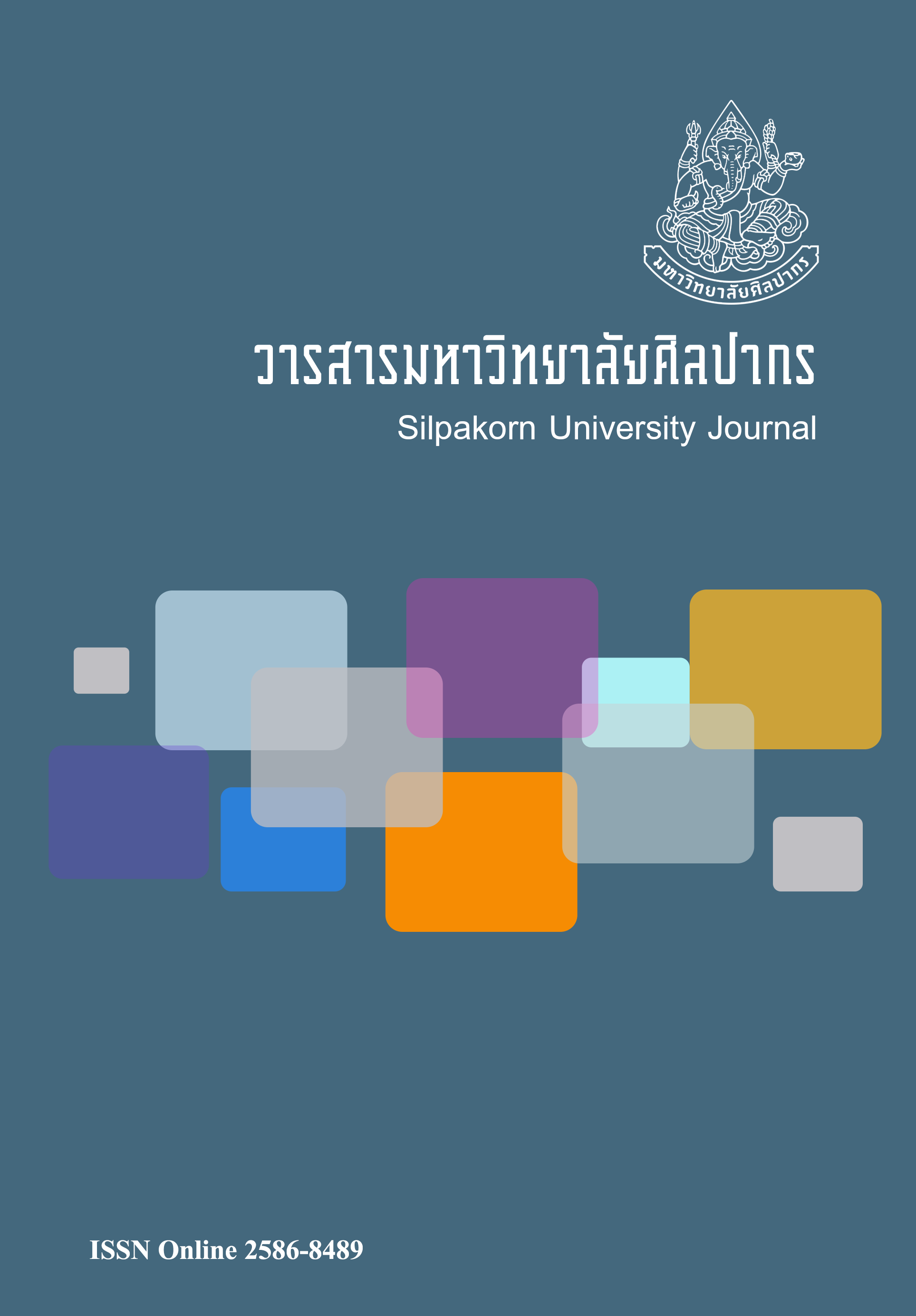กลยุทธ์การบริหารเทคโนโลยีสารสนเทศและการสื่อสาร เพื่อการศึกษา สำหรับสถานศึกษาระดับมัธยมศึกษาขนาดใหญ่ จังหวัดปทุมธานี (Information and communication technology management strategies for large secondary schools in Pathum Thani Province)
Main Article Content
Abstract
การวิจัยครั้งนี้มีวัตถุประสงค์เพื่อศึกษาสภาพปัจจุบันการบริหารเทคโนโลยีสารสนเทศและการสื่อสาร เพื่อการศึกษา และพัฒนากลยุทธ์การบริหารเทคโนโลยีสารสนเทศและการสื่อสารเพื่อการศึกษา สำหรับสถานศึกษาระดับมัธยมศึกษาขนาดใหญ่ จังหวัดปทุมธานี กลุ่มตัวอย่างที่ใช้ในการวิจัยครั้งนี้ ได้แก่ ผู้บริหารสถานศึกษา หัวหน้ากลุ่มสาระการเรียนรู้ และหัวหน้างานไอซีทีของสถานศึกษา จำนวน 8 โรงเรียน รวม 113 คน เครื่องมือที่ใช้ในการวิจัยคือ แบบสัมภาษณ์กึ่งมีโครงสร้างและแบบสอบถาม วิธีการดำเนินการวิจัย การวิเคราะห์สภาพปัจจุบันการบริหารเทคโนโลยีสารสนเทศและการสื่อสารเพื่อการศึกษา โดยเก็บรวบรวมข้อมูลจากเอกสารที่เกี่ยวข้อง การสัมภาษณ์ผู้อำนวยการสถานศึกษาและหัวหน้างานไอซีทีของสถานศึกษา และการพัฒนากลยุทธ์ โดยการวิเคราะห์ SWOT, TOWS Matrix จัดสนทนากลุ่มผู้เชี่ยวชาญและเก็บข้อมูลจากแบบสอบถามความคิดเห็น ผลการวิจัยพบว่า สภาพปัจจุบันการบริหารเทคโนโลยีสารสนเทศและการสื่อสารเพื่อการศึกษาใน 6 ด้าน มีดังนี้ 1) ด้านการบริหารจัดการภายใน พบว่า การจัดสรรงบประมาณเพื่อพัฒนามีอย่างต่อเนื่องแต่ยังไม่เพียงพอ 2) ด้านโครงสร้างพื้นฐาน พบว่า อุปกรณ์ทางเทคโนโลยีและซอฟต์แวร์ที่มีลิขสิทธิ์ ถูกต้องยังไม่เพียงพอ 3) ด้านการเรียนการสอน พบว่า ครูได้รับการอบรมการใช้ไอซีทีเพื่อการเรียนการสอน แต่ขาดการขยายผล 4) ด้านกระบวนการเรียนรู้ พบว่า ควรจัดกิจกรรมเพื่อเสริมสร้างผู้เรียนให้เกิดกระบวนการเรียนรู้โดยใช้ไอซีทีเพื่อการศึกษา อย่างต่อเนื่อง และวิธีการที่หลากหลาย 5) ด้านทรัพยากรการเรียนรู้ พบว่า เว็บไซต์สถานศึกษาเพื่อการเรียนการสอนยังไม่มีประสิทธิภาพ 6) ด้านความร่วมมือกับองค์กรภาครัฐ เอกชนและชุมชน พบว่า องค์กรภาครัฐ เอกชน ชุมชน และผู้ปกครองเห็นความสำคัญและสนับสนุนการพัฒนาไอซีทีเพื่อการศึกษาอย่างเต็มที่ การพัฒนากลยุทธ์มีเป้าประสงค์ ดังนี้ 1) เพื่อยกระดับคุณภาพการบริหารจัดการภายในให้เทียบเคียงมาตรฐานสากล 2) เพื่อสร้างสรรค์ผู้เรียนให้มีศักยภาพเป็นพลเมืองโลก 3) เพื่อเพิ่มประสิทธิภาพการเรียนการสอนของครูและบุคลากรทั้งระบบและ 4) เพื่อยกระดับการมีส่วนร่วมขององค์การภาครัฐ เอกชน ชุมชนและผู้ปกครอง ประกอบด้วยกลยุทธ์หลัก 7 กลยุทธ์ ดังนี้ 1) กลยุทธ์การพัฒนาระบบและการบริหารระบบให้สนับสนุนการใช้ ICT เพื่อการศึกษาอย่างมีประสิทธิภาพ 2) กลยุทธ์การพัฒนาโครงสร้างพื้นฐานด้าน ICT เพื่อการศึกษา 3) กลยุทธ์ การส่งเสริมการเรียนการสอนด้วย ICT เพื่อการศึกษา 4) กลยุทธ์การพัฒนาและส่งเสริมให้ครูและบุคลากรทางการศึกษาใช้ ICTเพื่อการศึกษา 5) กลยุทธ์การเสริมสร้างความเข้มแข็งทาง ICT เพื่อการศึกษาของผู้เรียน 6) กลยุทธ์การพัฒนาทรัพยากรการเรียนรู้ ICT เพื่อการศึกษาและ 7) กลยุทธ์การส่งเสริมความร่วมมือกับองค์กรภาครัฐ เอกชน ชุมชนและผู้ปกครอง
The purposes of this research were 1) to study the current status of ICT for education management and 2) to develop strategies for large secondary schools in Pathum Thani Province. The sample in this study was composed of 113 school administrators, heads of subject areas, and heads of ICT departments of 8 large secondary schools in Pathum Thani Province. The research instruments used for collecting data were semi-structured interviews and questionnaires. SWOT analysis and TOWS Matrix were used in developing new strategies.
The research showed that the current status in six areas of ICT for education management were as follows: (1) The internal management system: the budget for development was supported continuously; however, it was insufficient, (2) The infrastructure for ICT: the copyright software was inadequate. (3) The learning and teaching process: the teachers were trained in ICT for learning and teaching, but their experiences were not extended, (4) The learning process: the various ICT learning activities should be developed continuously, (5) The learning resources: the websites for learning and teaching were not efficient, and (6) The government, the private organizations and the community collaboration: every sectors realized the importance of ICT and supported ICT for education.
Moreover, the strategies for large secondary schools in Pathum Thani Province were developed to 1) improve the internal management quality to international standards, 2) encourage the learners to become the world citizens, 3) increase the efficiency of teachers and educational staffs, and 4) enhance the collaboration of the government, the private organizations, the community and parents. The new strategies included: (1) the efficient ICT for education supporting system development and management, (2) the development of ICT infrastructure for education, (3) the enhancement of teaching and learning with ICT, (4) the professional development for teachers and educational staffs in using ICT for education, (5) the strengthening of ICT for education for learners, (6) the development of ICT learning resources, and (7) the collaboration of the government, the private organizations, the community, parents, and schools.
Downloads
Article Details
References
Jamornman, K.\\ (2010).\\An Analytical Study of Information and Communication Technology Policies and Implementation of Secondary Schools in Thailand (การศึกษาวิเคราะห์นโยบายเทคโนโลยีสารสนเทศและการสื่อสารและการนำนโยบายสู่การปฏิบัติของโรงเรียนมัธยมศึกษาในประเทศไทย). Doctor of Philosophy, Chulalongkorn University, Bangkok, Thailand
Lab School Leadership Centre.(2011).Information and Communication Technology Development for Management and Teaching of Lab School Project(การพัฒนาการใช้ ICT เพื่อการบริหารจัดการและการจัดการเรียนการสอนของโรงเรียนผู้นำ ICT โรงเรียนในฝัน).\\Bangkok:Rungroad InterGroup.
Madaus,G.F.,Scriven,M.S., & Stufflebeam,D.L.\\(1983).\\EvaluationModelsViewpointson Educational and Human Services Evaluation. (8th ed.).Boston: Khuwer-Nijhoff Publishing
Ministry of Education.\\(2016).\\Prime Minister Meets Teachers (นายกรัฐมนตรีพบเพื่อนครู).\\Bangkok: Ministry of Education.
Ministry of Information Communication and Technology.\\(2011).\\Information Communication and Technology 2020 (กรอบนโยบายเทคโนโลยีสารสนเทศและการสื่อสารระยะ พ.ศ. 2554-2563 ของประเทศไทย).\\Bangkok: Ministry of Information Communication and Technology.
Nilsook,P., & Jitsupa,J.\\(2013).\\InformationandCommunicationTechnologyAdministrationForEducation (การบริหารเทคโนโลยีสารสนเทศและการสื่อสารเพื่อการศึกษา).\\Bangkok: King Mongkut’s University of Technology North Bangkok.
Office of the Education Council.\\(2011).\\A Continuous Training Course in Using Technology for Life-Long Learning Education for Teachers, Educational Personnel and Learners (แนวทางการดำเนินงานเพื่อขยายผลการพัฒนาศักยภาพครูและบุคลากรทางการศึกษาในการใช้สื่อเทคโนโลยีเพื่อการศึกษาเรียนรู้ตลอดชีวิต).\\Bangkok: 21 Century Co., Ltd.
Office of the Permanent Secretary, Ministry of Education.\\(2011).\\Information and Communication Technology for Ministry of Education Master Plan 2011-2013 (แผนแม่บทเทคโนโลยีสารสนเทศและการสื่อสารเพื่อการศึกษา กระทรวงศึกษาธิการ พ.ศ. 2554-2556).\\Bangkok: Ministry of Education.
Panich, W.\\(2012).\\Learning for student in the 21st Century (วิถีสร้างการเรียนรู้เพื่อศิษย์ในศตวรรษที่ 21).\\Bangkok: Tathata Publication Co., Ltd.
Suksriwong, S.\\(2009).\\Management: From the Executive’s Viewpoint (การจัดการ : จากมุมมองนักบริหาร).\\Bangkok: G.P.
Thew, J., & Donachie, Jr.\(2000).\\Titanium: A Technical Guide. Metals Park, OH: ASM International.
Jirawacharakorn, T.\ (2011). \A model of Geographic Information System of Small Schools in Bangkok Metropolitan Administration (รูปแบบระบบสารสนเทศภูมิศาสตร์สำหรับสถานศึกษาขั้นพื้นฐานขนาดเล็ก สังกัดกรุงเทพมหานคร).\\suthiparithat, 25(77), 47-62Cyberprint.


